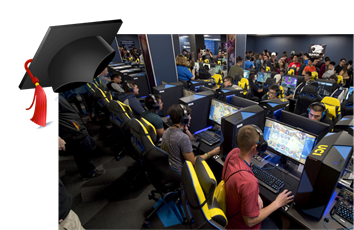
eSports Scholarships Becoming the New Norm for Colleges and Universities
In the world we live in, eSports are part of our reality. The first generation of gamers who grew up playing the video games at the heart of eSports are now adults, and for many of them, playing video games is still an important part of their daily life and even their identity. The same could be said of the teenagers and even children playing video games now.
The video game industry in itself is huge, providing cheap entertainment in the games that feature complex storylines and a modern social platform. It makes sense that the applications of something that has captured the attention of so many people are increasing. The culture of gaming is everywhere; even activities such as driving your car are increasingly gamified.
Playing, watching and betting on eSports are, logically, activities as natural to young people today as playing, watching and betting on Soccer. This is becoming less of a theoretical truth and more of a factual reality on a daily basis. As eSports become more recognised, the competitions are also becoming more regulated and formalised. Nowhere is this more clearly seen than in the steady rise in eSports scholarships at colleges in North America and in other countries.
Natural Progression and Integration of the eSports Industry
Not only is the eSport industry maturing, but so too is our understanding of the eSport culture. The scholarship programmes that are being offered at several United States universities, as well as Garnes Vidaregaande Skule in Norway and Arlanda Gymnasiet School in Sweden, are about more than simply creating a dominant eSport side.
Winning is part of the appeal, of course, especially since, unlike with physical sports, college eSport teams are permitted to draft in professional competitors. More than that, though, the aim of the eSports programmes at various universities is to encourage camaraderie, socialisation and knowledge of the industry.
With huge arenas being filled around the world and elite players earning as much as their physical-athlete counterparts, eSports is here to stay and the industry is going to require your professionals who know and understand how it works. This experience and training is a huge part of why colleges are investing more in eSports scholarship programmes, as are the concepts of attracting more students, promoting school spirit and bringing like-minded individuals together.
eSport athletes are as respected around campuses as Football stars and other regular athletes are, and they train just as rigorously. The programmes also have a really collaborative feel, as seen in the fact that the Physical Therapy School at Missouri’s Southwest Baptist College is researching what the surge of adrenaline does to players who don’t get to move around, on eSport athletes. Physical, mental and even spiritual exercised are also part of the regime, which, in the words of Southwest Baptist’s head eSports coach Chris Allen, is all about community.
eSports Colleges Cropping Up Across the Globe
The interest in organising eSports as a whole is seen not only at college level, but also as worldwide teams, competitions and championships are convened. No less than 50 colleges in North America have established varsity gaming teams over the course of the last 3 years.
The growth and acknowledgement of the culture that is seen in eSports already is encouraging, but more needs to be done. However, in addition to Southwest Baptist College, Garnes Vidaregaande Skule and Arlanda Gymnasiet, it’s possible to apply for eSports scholarships to the University of Pikeville, Columbia College, the University of California, Irvine the WME-IMG Academy, all in the United States.
As the world changes and video games become an ever-increasingly important feature, eSports should continue to gain prominence. Attracting its future stars now makes sense for colleges, while using their skills to cope with modern life, get through college and even make a living makes sense for players. Essentially, it is a win-win situation, and as times change, education needs to adapt and move forward; and this is clear evidence that that is exactly what is happening.
